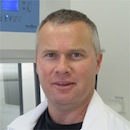Academic Editors
The following people constitute the Editorial Board of Academic Editors for PeerJ. These active academics are the Editors who seek peer reviewers, evaluate their responses, and make editorial decisions on each submission to the journal. Learn more about becoming an Editor.

Branka Horvat
MD PhD,
Head of the team Immunobiology of Viral Infection;
Research in the field of interaction between the virus and the immune system

Elaine A Dunlop
Dr. Elaine Dunlop is a Lecturer in the Division of Cancer and Genetics at Cardiff University. She received her PhD in Cancer Research from Queen's University, Belfast and her research now centres on the inherited genetic conditions, Tuberous Sclerosis Complex and Birt-Hogg-Dubé syndrome where patients are predisposed to develop cysts and tumours. She is interested in the crossover between the cell signalling observed in these genetic diseases and the pathways which are at fault in cancer, with a focus on mTORC1 growth pathways, autophagy and the tumour microenvironment.

Andy J Turko
Assistant Professor, University of Guelph.
I am a comparative animal physiologist who integrates across disciplines and levels of biological organization to understand how animals cope with changing environmental conditions, and why some individuals and species are better able to tolerate these changes than others. Particular interests are understanding how animals sense environmental change, and how the phenotype is adjusted in response (i.e. plasticity). My research is focussed on fish functional morphology and respiratory physiology, but also includes evolutionary physiology, behavioural ecology, and conservation biology.

Edsel B Ing
Edsel Ing MD, FRCSC, MPH, CPH, MIAD is a Professor at the University of Toronto and Surgeon at Michael Garron Hospital.
Clinical & Research interests: Eyelid/Orbital diseases (oculoplastics), Strabismus surgery & Neuro-ophthalmology
MPH & GCSRT: Harvard
CEduHP: Hopkins
MD & Residency: U Toronto
Fellowships: Mayo Clinic, Wills Eye, Allegheny General
PhD Candidate (May 2020): Kingston U
Masters of International Affairs: United Nations ITR & U Catalonia
Section Editor: Can J Ophthalmology, Can J Diagnosis, Medscape Ophthalmology

Cristina Becchio
Cristina is Associate Professor at the Psychology Department, University of Turin, and Senior Researcher at the Robotics, Brain and Cognitive Sciences Department, Italian Institute of Technology, Genova. After studying philosophy at the University of Turin, she joined a PhD Program in Cognitive Science in 2001. She became researcher at the University of Turin in 2006. She is interested in the cognitive and neural mechanisms underlying motor cognition.

Corinne I. Lasmezas
Corinne Lasmézas, DVM, Ph.D. serves as a Professor at The Scripps Research Institute. Since Dr. Lasmézas' appointment at Scripps in 2005, she has focused on how misfolded proteins lead to neuronal dysfunction and loss in diseases including Alzheimer’s, Parkinson’s and prion diseases. Additionally, Dr. Lasmézas is a reviewer for national and private funding agencies worldwide, including the US National Institutes of Health (NIH) and the UK Medical Research Council and an Advisor for the US Food and Drug Administration (FDA), the US Environmental Protection Agency (EPA) and the US Department of Agriculture (USDA). Earlier in her career, Dr. Lasmézas’ research provided the first experimental evidence that the prion disease “mad cow disease” had been transmitted to humans, causing variant Creutzfeldt-Jakob disease. At the peak of the mad cow crisis, Dr. Lasmézas became an advisor to the World Health Organization (WHO) as well as several governmental and public health committees. She is multiple TED speaker and is an internationally recognized expert in the field of neurodegenerative diseases. She has published more than 60 original scientific papers. She has been a Member of Scientific Advisory Board at Anavex Life Sciences Corp. since March 2015. Dr. Lasmézas holds a PhD in Neurosciences from the University Pierre & Marie Curie in Paris and obtained her Doctorate of Veterinary Medicine and Diploma of Aeronautic and Space Medicine from the University of Toulouse, France.

Pia H Moisander
Dr. Pia Moisander is a marine microbial ecologist and a Professor at the Department of Biology and the Department of Estuarine and Ocean Sciences at the University of Massachusetts Dartmouth. Her primary research focus is on the marine nitrogen fixation, microbiomes, biofilms, and microbial community assembly.

Peter S. Solomon
Professor, Wheat Biosecurity. Australian Research Council Future Fellow, Research School of Biology, The Australian National University. Associate Editor of Functional Plant Biology

Michela Bertolotto
Dr Michela Bertolotto obtained her PhD in Computer Science from the University of Genova (Italy). She is currently an Associate Professor at the School of Computer Science, University College Dublin.
Her main interests are in Spatial Information Systems and Science.

Robert H McDonald
Robert H. McDonald is Dean of University Libraries and Professor of Library Administration. He is responsible for leading the Boulder campus library system in fulfilling their mission to inspire learning, research, and discovery by connecting knowledge, information, and people.
His expertise and interests include teaching and learning technologies that enable libraries to better support researchers at all levels, open source software development, scholarly communications, and new model publishing. Robert has also been an active proponent of diversity initiatives in libraries throughout his career and is committed to creating library spaces that are welcoming, diverse and inclusive for all of our Library users.

Ying Ying Han
Associate Researcher in Center of System Biomedical Sciences, University of Shanghai for Science and Technology

Antonella Loperfido
Dr. Loperfido graduated in Medicine and Surgery at the University of Siena and subsequently specialized in Otolaryngology at the Catholic University of the Sacred Heart - Gemelli Hospital in Rome. She works at the largest tertiary public hospital in Rome: San Camillo Forlanini Hospital. She has received specific training in rhinology, with special focus on innovative medical treatment with biological drugs for chronic rhinosinusitis with nasal polyps at La Sapienza University in Rome.
Dr. Loperfido is a member of the Italian Society of Otolaryngology and Head and Neck Surgery (SIOeChCF), she is the author of several publications on national and international journals, she is particular active as reviewer and she is currently serving as editorial board member in multiple scientific journals.

